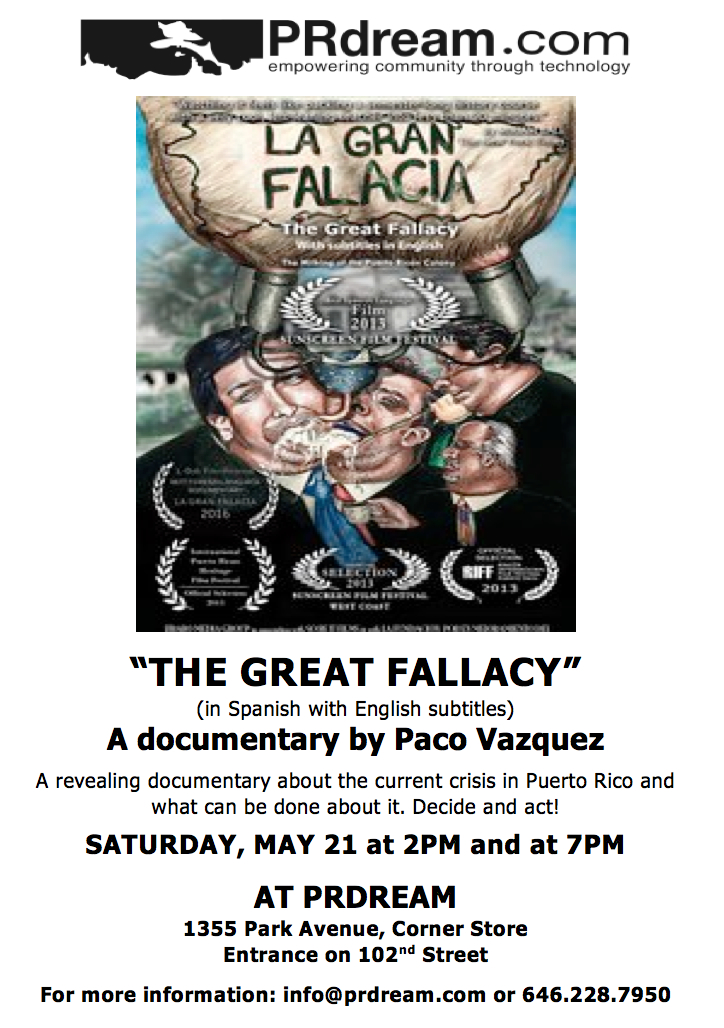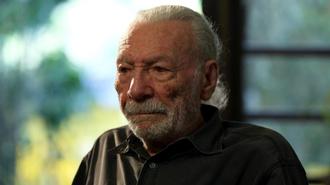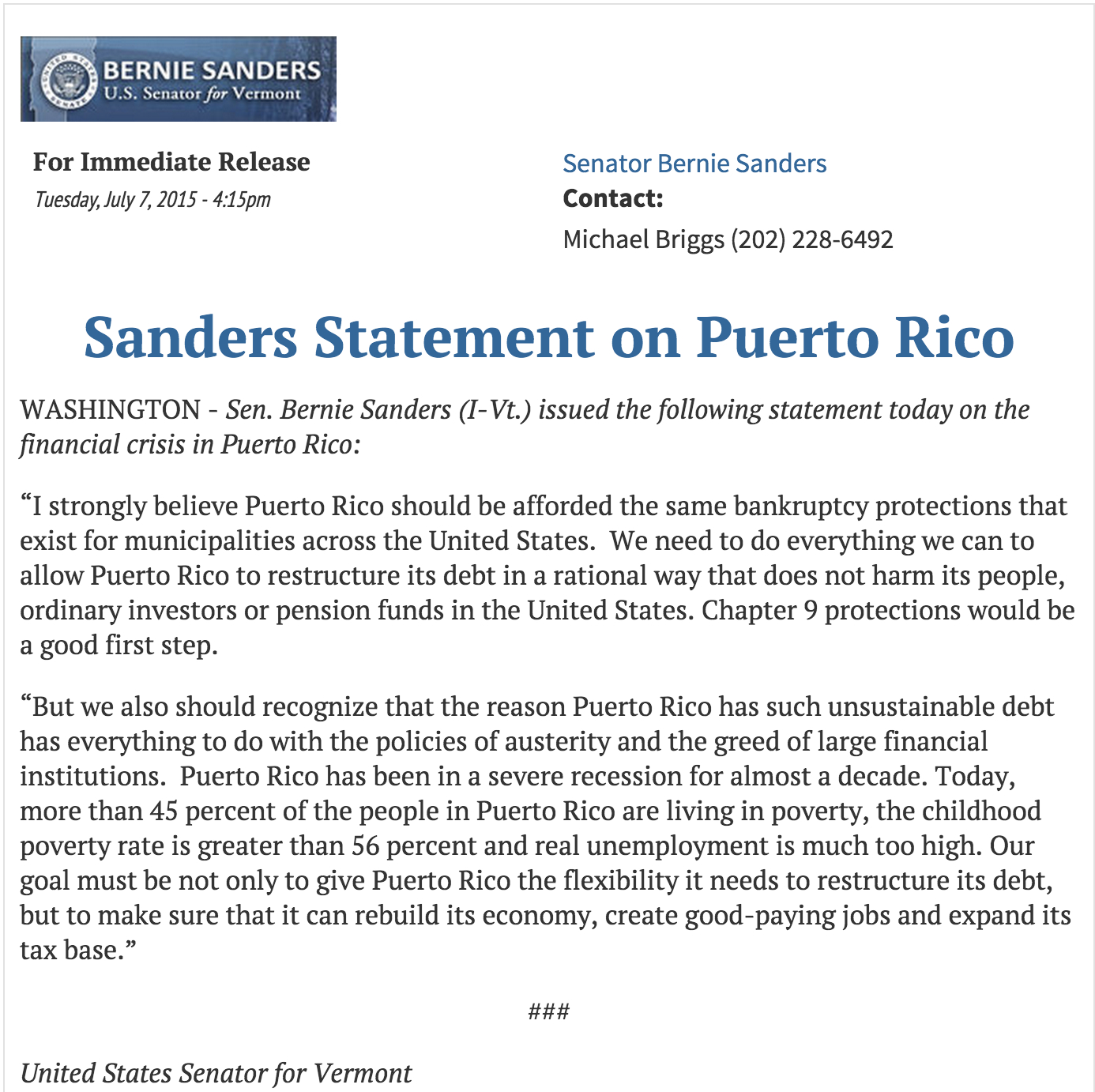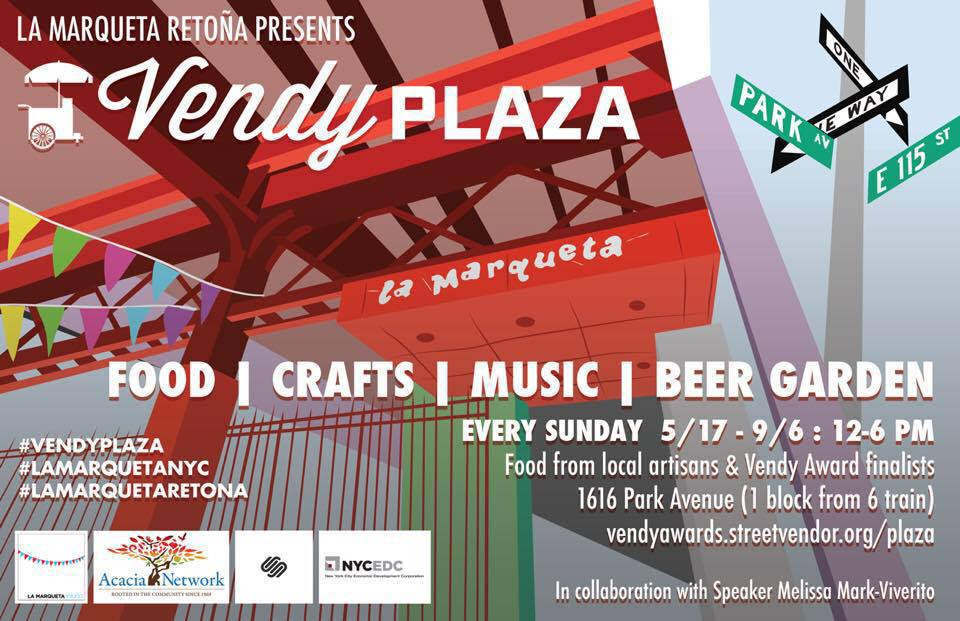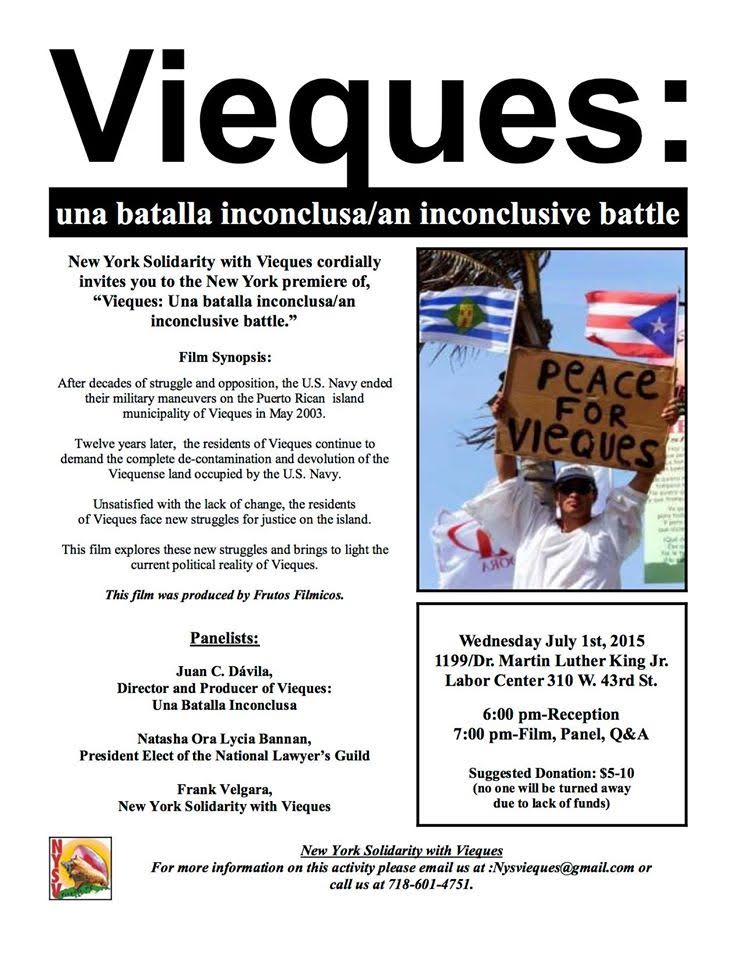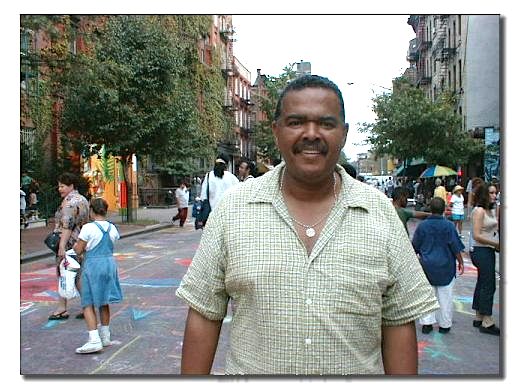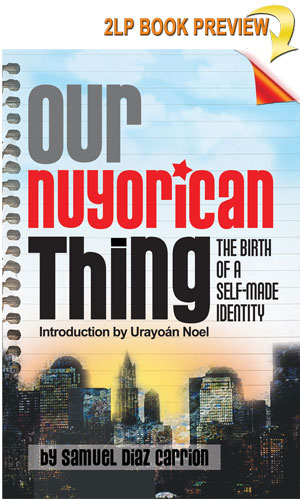Category Archives: The Forum
PRdream mourns the passing of Gilberto Gerena Valentin 1918 – 2016
PRdream mourns the passing of Gilberto Gerena Valentin, Puerto Rican political activist and labor organizer.
Gilberto Gerena Valentín is a key figure in the development of the Puerto Rican community in the United States, especially from the forties through the seventies. He was a union organizer, community leader, political activist and general in the war for the civil rights recognition of his community. In his memoirs, Gilberto Gerena Valentín takes us into the center of the fierce labor, political, civil rights, social and cultural struggles waged by Puerto Ricans in New York from the 1940s through the 1970s.
FROM CENTRO VOICES
Centro’s publication Soy Gilberto Gerena Valentín: memorias de un puertorriqueño en Nueva York was presented last Thursday, May 23, at El Centro de Estudios Avanzados de Puerto Rico y el Caribe.
An energetic, enthusiastic and overtly cheerful Gerena (age 94) shared his memories at the presentation. He stressed “Un pueblo que se moviliza cambia. Y yo voy a seguir dando la pelea hasta que me muera.” (Tweeted by GracielaRodzMar). Translated as, “a nation that moves, changes, and I’m going to keep giving the fight until I die.”
Dennis Rivera, member of the advisory board of the Center for Puerto Rican Studies, who was also at the event, addressed Gerena’s involvement in community issues. Rivera told how he had met Gerena when Rivera moved to New York in the 1980s, at a time when the Bronx Lebanon Hospital was about to be shut. Gerena encouraged protesters to join a massive march, which they did. Rivera shared this experience to emphasize that “with Gerena any problem was a collective one. That’s how good he was as a leader.”
Xavier Totti, editor of Centro Publications was there to introduce the book. Totti stressed the contributions of this publication to the history of Puerto Ricans in New York. He mentioned that “this book opens a new page in the history of Puerto Ricans in New York by highlighting the importance of union and community organization in the civil rights movement. The history of the fights for civil rights has been untold and is revealed in Gerena’s book.”
Miguel Rodríguez López, provost of El Centro de Estudios Avanzados, was pleased to welcome the large group of attendees and host at the institution the type of debate unveiled by Gerena’s book. Located in historic Old San, El Centro de Estudios Avanzados is a higher education institution with a graduate program whose objective is to develop individuals committed with Puerto Rico and its culture. Edwin Meléndez, director of el Centro de Estudios Puertorriqueños emphasized how events like Gerena’s book presentation encourages a dialogue about the diaspora in Puerto Rico.
PRdream mourns the passing of Rosario Ferré, September 28, 1938 – February 18, 2016
The grande dame of Puerto Rican belles lettres has died! Rosario Ferré was born in 1938 in Ponce, Puerto Rico. In 1960 she graduated from Manhattanville College in New York as an English major. She obtained her Masters degree in Spanish and Latin American literature from the University of Puerto Rico in 1985 and her Ph.D. from the University of Maryland in 1987. She began writing in 1970, when she edited and published a literary magazine called Zona de carga y descarga in Puerto Rico. This magazine published the works of young Puerto Rican writers, many of whom have later become well-known in the literary landscape of the island. In 1976 she published her first book of short stories, Papeles de Pandora (Mortiz, México). That same year she received a prize at the Ateneo Puertorriqueño and at Casa de las Américas, in Cuba, for her short stories. In 1978 she published El medio pollito, a book of fables (Huracán, P.R.); in 1981 La mona que le pisaron la cola and Los cuentos de Juan Bobo (Huracán, P.R.), children’s stories.
From 1977 to 1980 she wrote a column of literary criticism in the Puerto Rican newspaper, El Mundo, called “Carga y Descarga.” In 1982 she published a book of feminist essays, Sitio a Eros (Mortiz, México), and re-edited in an expanded version in 1985; in1984 she published her first book of poems, Fábulas de la garza desangrada (Mortiz, México). Her novel Maldito Amor (Mortiz), was published in 1985 and has been re-edited many times, by editorial Hispanoamericana in Argentina, and Huracán in Puerto Rico; in 1987 she published El acomodador, una lectura fantástica de Felisberto Hernández (Fondo de Cultura Económica, México). A book of critical essays about the Argentinian writer Julio Cortázar, El romántico en su observatorio, was published in 1990.
Ferré did a version of Maldito Amor in English, and it was published as Sweet Diamond Dust in January 1989 by Ballantine Books, N.Y.. It was reprinted by Dutton Plume in 1996. A book of fables, Sonatinas, was published in August 1989 by Huracán in Puerto Rico. A book of literary essays, El árbol y sus sombras, was published in November of 1989 by Fondo de Cultura Económica, in México. Her book of essays, El coloquio de las Perras, was published by Editorial Cultural in PR in1991. A book of short stories, The Youngest Doll, (an English version of Papeles de Pandora) was published in 1991 by the University of Nebraska Press. Editorial Cultural in Puerto Rico published her book on Julio Cortázar ‘s short stories, El romántico en su observatorio (1992).
In 1992 she published Las dos Venecias, a book of poems and short stories, with Mortiz, Mexico; as well as Memorias de Ponce, a biography of her father, Luis A. Ferré, with Editorial Norma, in Colombia. In 1992 she received the Liberatur Prix in Frankfurt, Germany, for her novel Kristalzucker, a translation of Sweet Diamond Dust into German, published in Switzerland by Rotpunkverlag. Her children’s stories have also been translated into German as Die Halbe Hunchen, and were published in Frankfurt. In1996 she was invited to participate as an honorary guest in the Grinzane Cavour prize in Turin, Italy, as a Puerto Rican writer. La batalla de las vírgenes, a novella, was published in1994 by Editorial Universitaria, in Río Piedras, P.R. Her anthology of poems, Antología Personal, was published by Editorial Cultural that same year. In 1997 Editorial Santillana-Alfaguara has published her children’s stories in Puerto Rico.
The novel, The House on the Lagoon, came out published by Farrar, Straus, Giroux in New York, in September,1995, and was picked as one of the five finalists for the National Book Award in the U. S. It also received the Critic’s Choice Award and was selected for the Book of the Month Club in 1995.
The Spanish version of this novel was published 1997 by EMECE in Spain. It was also published in Germany, Britain, The Netherlands, France, Poland, Italy and Greece. Her novel, Eccentric Neighborhoods, was published by Farrar, Straus and Giroux in March, 1998, and has recently been published by Editorial Planeta in Mexico and Vintage Español in the U.S. in Spanish. It was also published in Germany, with Krüger Verlag, in 1999, and in Italy, Holland and France.
Her most recent book of essays, A la sombra de tu nombre, was published by Alfaguara and is currently on sale in Puerto Rico and the United States. Her latest novel, Flight of the Swan, has was published by Farrar Straus and Giroux.
© Rosario Ferré, All Rights Reserved
U.S. Senator Bernie Sanders on Puerto RIco’s Economic Crisis
The Puerto Rican Economic Crisis: A radio interview with Nelson Denis by Howard Jordan
This is an excellent interview with Nelson Denis about the economic crisis in Puerto Rico. He has emerged as a strong and informed voice about the present situation on our beloved island, offering a new vision that our “leadership” aqui y alla should heed. If not, the people will make them listen. Well done Nelson. Looking forward to the next meeting. Howard Jordan, thank you for giving Nelson the microphone!
I love Nelson’s use of Freddy Krueger who killed while his victims slept. It is an apt metaphor for the current situation Puerto Ricans find themselves in. The Krueger Report, according to Nelson, will eviscerate the island by proposing to privatize even more revenue-generating areas of the economy and shutting down schools. Thus, tearing away the commonwealth veil and revealing the naked truth of colonialism through increasingly intolerable austerity. !Despierta Boricua!
CRISIS IN PUERTO RICO – Rosario Rivera Negrón, Senior Economist
Rosario Rivera is an economics professor at the University of Puerto Rico and a senior economist with more than 10 years of experience on economic analysis and research for the firm Soto Santoni and Associates. With expertise in the areas of economic research, analysis, econometrics, economic development and international trade, Mrs. Rivera has worked in various professional sectors such as government, construction industry, the banking industry and international business consulting. Also has served as advisor on economic development, tourism, and strategic planning for the City of Caguas (Puerto Rico) and as consultant on fiscal policy and budget for the Budget Comission of the House of Representatives of Puerto Rico.
She is the co-author of the book “Puerto Rico 2000-2010: Mas Alla del Censo” (Puerto Rico 2000-2010: Beyond the 2010 US Census), recently published. She has been part of numerous associations such as the Association of Economists of Puerto Rico, American Economic Association, Latin American and Caribbean Economic Association, among others.
La Marqueta Retoña presents VENDY PLAZA
Vieques: Una batalla inconclusa
PRdream mourns the passing of Fernando Salicrup, August 6, 1946 – January 1, 2015
Fernando Salicrup was born in El Barrio/Spanish Harlem, where he lived and worked as an artist and cultural entrepreneur. As Executive Director of Taller Boricua (Puerto Rican Workshop), he was instrumental in the development of the arts and cultural corridor in El Barrio.
In the 1980’s, Salicrup was active in providing housing for artists. He spearheaded the renovation of a city-owned public school building and its conversion into the Julia de Burgos Cultural Center, one of the oldest cultural organizations of the historically Puerto Rican/Latino community. The center is the home of Taller Boricua and other art organizations, offering exhibitions and concerts year-round. Salicrup was a member of Manhattan Community Board 11 for several terms.
First and foremost a painter and printmaker, Salicrup worked continuously on his art while advocating for broader social issues impacting the cultural life of his community. His work has been exhibited throughout the United States, Latin America and Europe. In New York City he has shown at El Museo del Barrio, the New Museum of Contemporary Art, and the Bronx Museum of the Arts. The XII San Juan Biennial of Latin American and Caribbean Printmaking.recognized him for his experimental print-making.
He also taught workshops in printmaking and served as a mentor to hundreds of young artists, writers and musicians.
Fernando Salicrup enlisted in the U.S. Marines Corps and served in the Vietnam War. He studied at the Philadelphia Academy of Art and, subsequently, won a scholarship to the New York School of Visual Arts, where he studied painting under Chuck Close and printmaking under Robert Blackburn.
He is survived by his wife of 40 years, Zoraida Salicrup, their sons Fernando Salicrup lll and Danel Salicrup; his daughter Cynthia Blake; and four grandchildren.
“Our Nuyorican Thing” by Sam Diaz
Fascinating book: http://2leafpress.org/online/our-nuyorican-thing/
Sam Diaz, the author, writes about the Nuyorican Poet’s Cafe and how the term Nuyorican went from being derogatory, defining stateside Puerto Ricans, to complimentary, defining an arts and political movement that grew to encompass all ethnicities and nationalities on the margins: The emergent poetry slams and open mics for the spoken word, the true freedom of speech granted to the youth of the voiceless Puerto Rican communities of New York that eventually grew and spread nationally, then internationally to other voiceless communities and their youth.
